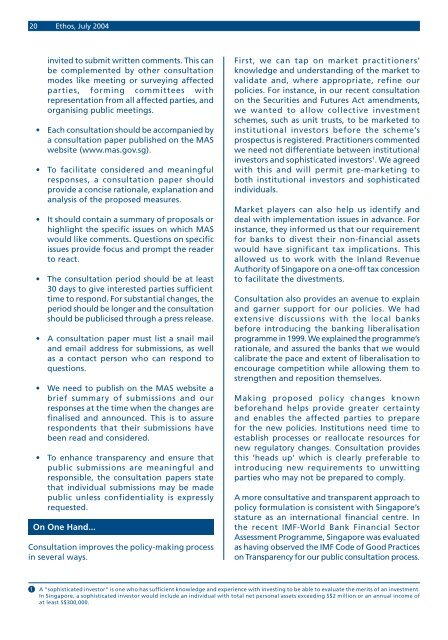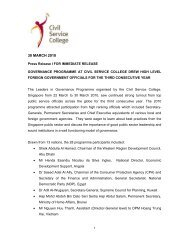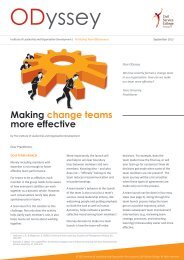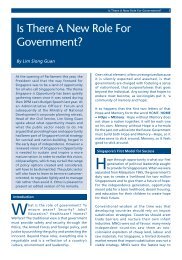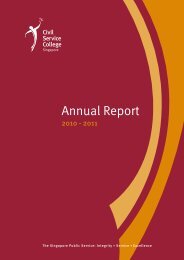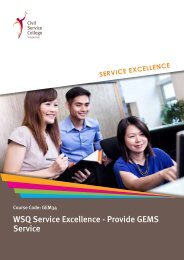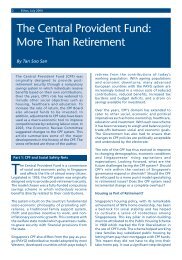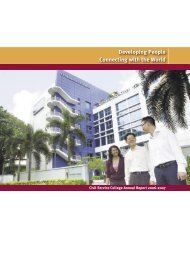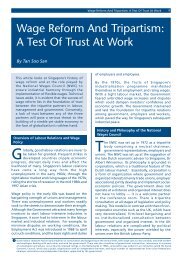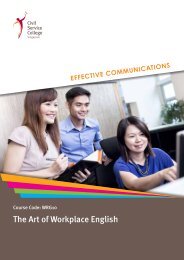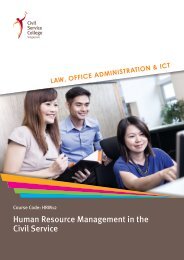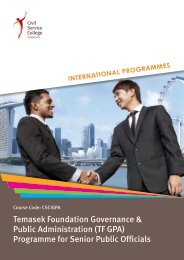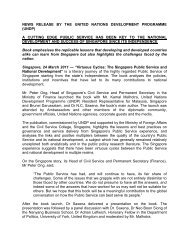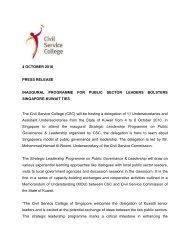The Monetary Authority of Singapore and Public Consultation
The Monetary Authority of Singapore and Public Consultation
The Monetary Authority of Singapore and Public Consultation
Create successful ePaper yourself
Turn your PDF publications into a flip-book with our unique Google optimized e-Paper software.
20 Ethos, July 2004<br />
invited to submit written comments. This can<br />
be complemented by other consultation<br />
modes like meeting or surveying affected<br />
parties, forming committees with<br />
representation from all affected parties, <strong>and</strong><br />
organising public meetings.<br />
• Each consultation should be accompanied by<br />
a consultation paper published on the MAS<br />
website (www.mas.gov.sg).<br />
• To facilitate considered <strong>and</strong> meaningful<br />
responses, a consultation paper should<br />
provide a concise rationale, explanation <strong>and</strong><br />
analysis <strong>of</strong> the proposed measures.<br />
• It should contain a summary <strong>of</strong> proposals or<br />
highlight the specific issues on which MAS<br />
would like comments. Questions on specific<br />
issues provide focus <strong>and</strong> prompt the reader<br />
to react.<br />
• <strong>The</strong> consultation period should be at least<br />
30 days to give interested parties sufficient<br />
time to respond. For substantial changes, the<br />
period should be longer <strong>and</strong> the consultation<br />
should be publicised through a press release.<br />
• A consultation paper must list a snail mail<br />
<strong>and</strong> email address for submissions, as well<br />
as a contact person who can respond to<br />
questions.<br />
• We need to publish on the MAS website a<br />
brief summary <strong>of</strong> submissions <strong>and</strong> our<br />
responses at the time when the changes are<br />
finalised <strong>and</strong> announced. This is to assure<br />
respondents that their submissions have<br />
been read <strong>and</strong> considered.<br />
• To enhance transparency <strong>and</strong> ensure that<br />
public submissions are meaningful <strong>and</strong><br />
responsible, the consultation papers state<br />
that individual submissions may be made<br />
public unless confidentiality is expressly<br />
requested.<br />
On One H<strong>and</strong>...<br />
<strong>Consultation</strong> improves the policy-making process<br />
in several ways.<br />
First, we can tap on market practitioners’<br />
knowledge <strong>and</strong> underst<strong>and</strong>ing <strong>of</strong> the market to<br />
validate <strong>and</strong>, where appropriate, refine our<br />
policies. For instance, in our recent consultation<br />
on the Securities <strong>and</strong> Futures Act amendments,<br />
we wanted to allow collective investment<br />
schemes, such as unit trusts, to be marketed to<br />
institutional investors before the scheme’s<br />
prospectus is registered. Practitioners commented<br />
we need not differentiate between institutional<br />
investors <strong>and</strong> sophisticated investors 1 . We agreed<br />
with this <strong>and</strong> will permit pre-marketing to<br />
both institutional investors <strong>and</strong> sophisticated<br />
individuals.<br />
Market players can also help us identify <strong>and</strong><br />
deal with implementation issues in advance. For<br />
instance, they informed us that our requirement<br />
for banks to divest their non-financial assets<br />
would have significant tax implications. This<br />
allowed us to work with the Inl<strong>and</strong> Revenue<br />
<strong>Authority</strong> <strong>of</strong> <strong>Singapore</strong> on a one-<strong>of</strong>f tax concession<br />
to facilitate the divestments.<br />
<strong>Consultation</strong> also provides an avenue to explain<br />
<strong>and</strong> garner support for our policies. We had<br />
extensive discussions with the local banks<br />
before introducing the banking liberalisation<br />
programme in 1999. We explained the programme’s<br />
rationale, <strong>and</strong> assured the banks that we would<br />
calibrate the pace <strong>and</strong> extent <strong>of</strong> liberalisation to<br />
encourage competition while allowing them to<br />
strengthen <strong>and</strong> reposition themselves.<br />
Making proposed policy changes known<br />
beforeh<strong>and</strong> helps provide greater certainty<br />
<strong>and</strong> enables the affected parties to prepare<br />
for the new policies. Institutions need time to<br />
establish processes or reallocate resources for<br />
new regulatory changes. <strong>Consultation</strong> provides<br />
this ‘heads up’ which is clearly preferable to<br />
introducing new requirements to unwitting<br />
parties who may not be prepared to comply.<br />
A more consultative <strong>and</strong> transparent approach to<br />
policy formulation is consistent with <strong>Singapore</strong>’s<br />
stature as an international financial centre. In<br />
the recent IMF-World Bank Financial Sector<br />
Assessment Programme, <strong>Singapore</strong> was evaluated<br />
as having observed the IMF Code <strong>of</strong> Good Practices<br />
on Transparency for our public consultation process.<br />
1 A “sophisticated investor” is one who has sufficient knowledge <strong>and</strong> experience with investing to be able to evaluate the merits <strong>of</strong> an investment.<br />
In <strong>Singapore</strong>, a sophisticated investor would include an individual with total net personal assets exceeding S$2 million or an annual income <strong>of</strong><br />
at least S$300,000.


